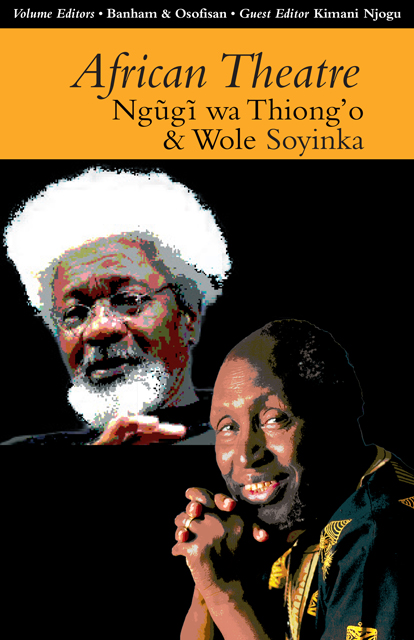Book contents
- Frontmatter
- Contents
- Notes on Contributors
- Obituary of Pat Amadu Maddy
- Introduction
- Reading & Performing African Drama: How Wole Soyinka & Ngũgĩ wa Thiong’o influenced my work
- Ayan Contra Ujamaa: Soyinka & Ngũgĩ as theatre theorists
- Encounters with Soyinka
- Encounters with Ngugi
- Wole Soyinka & Ngũgĩ wa Thiong’o: Plays in Production
- The Making of The Trial of Dedan Kĩmathi by Ngũgĩ wa Thiong’o & Mĩcere Gĩthae Mũgo at the University of California, Irvine: A personal reflection
- Playscript: A Rain of Stones
- Book Reviews
I - Choru wa Mũirũrĩ: Reflections on the Kamĩrĩĩthũ experience
Published online by Cambridge University Press: 23 February 2023
- Frontmatter
- Contents
- Notes on Contributors
- Obituary of Pat Amadu Maddy
- Introduction
- Reading & Performing African Drama: How Wole Soyinka & Ngũgĩ wa Thiong’o influenced my work
- Ayan Contra Ujamaa: Soyinka & Ngũgĩ as theatre theorists
- Encounters with Soyinka
- Encounters with Ngugi
- Wole Soyinka & Ngũgĩ wa Thiong’o: Plays in Production
- The Making of The Trial of Dedan Kĩmathi by Ngũgĩ wa Thiong’o & Mĩcere Gĩthae Mũgo at the University of California, Irvine: A personal reflection
- Playscript: A Rain of Stones
- Book Reviews
Summary
Choru wa Mũirũrĩ was born 62 years ago in Kamaandũra – a village near Kamĩrĩĩthũ – but grew up in Kamĩrĩĩthũ itself, where his father, a settler’s cook, stationed his young family during the period of independence agitation in a concentration village which had been established by the then colonial administration in its effort at quashing the Mau Mau rebellion. He started his primary education at Lĩmuru Mission Primary, then called Holy Ghost Missionary and proceeded to Ngenia High School for his O-level education.
Kamĩrĩĩthũ Community and Education Centre was established in 1976. Its main agenda was improvement of literacy in Kamĩrĩĩthũ and its environs and its key targets were the adults and elderly who did not have a basic education. As an educated member of Kamĩrĩĩthũ community, Choru was requested to assist in teaching as a volunteer at the centre and he readily agreed. He started teaching Language at the elementary level to the elderly learners. He states his teaching methodology was dictated by the memory he had of how his teachers used to teach them as he was not a trained teacher himself.
It was while at the Centre that the idea of theatre was introduced to him, and he claims that he had no prior experience in theatre or drama. Ngũgĩ wa Mĩriĩ, his age mate and school mate, joined Kamĩrĩĩthũ as a researcher from the University of Nairobi’s Department of Education and Extra-Mural Studies, in adult education and literacy. When Ngũgĩ wa Thiong’o came, the Centre had already formed various committees which had been charged with helping the management run the Centre, and the question of what could be done to make the Centre more useful to the community had already been raised. After some persuasion Ngũgĩ wa Thiong’o agreed to write the play that finally emerged as Ngaahika Ndeenda / I Will Marry When I Want. The title resonated well with the people as this was taken from the then popular song by D.K. wa Wanja with the same title.
Choru, as a volunteer teacher and member of the committee, was amongst the first people to read the script. The number of people who wanted take part were so many that most roles were given to more than one actor. The issues that the play raised were based on the actors’ real live experiences and so the relationship between reality and fiction was collapsed.
- Type
- Chapter
- Information
- African Theatre 13Ngugi wa Thiong'o and Wole Soyinka, pp. 37 - 41Publisher: Boydell & BrewerPrint publication year: 2014



